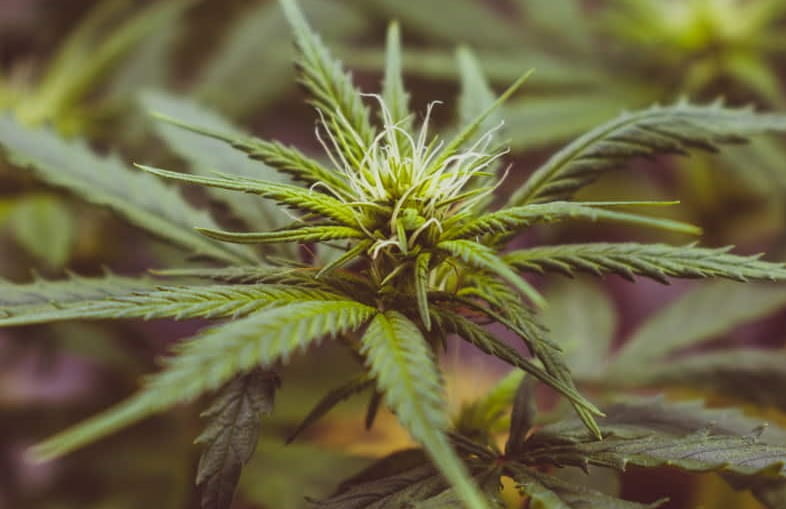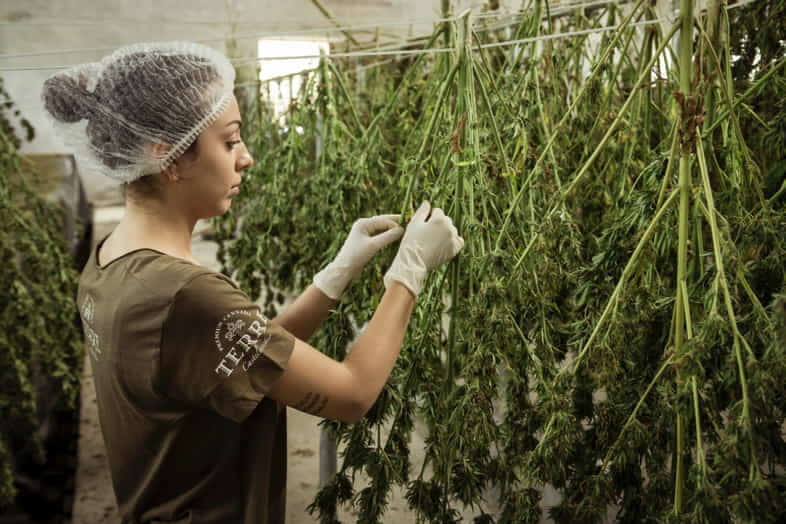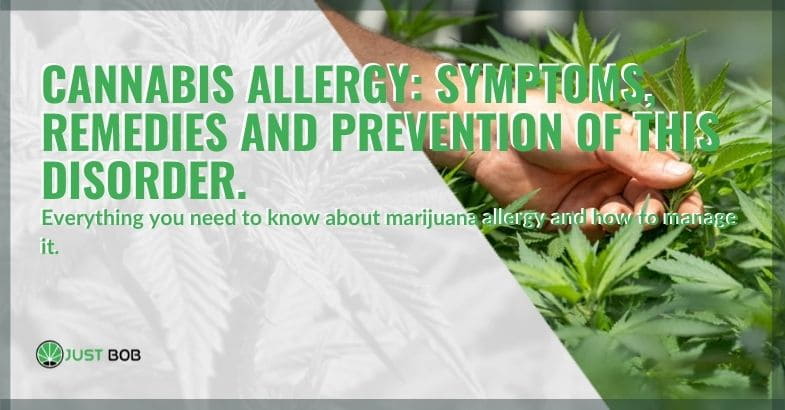Modified on: 22/12/2023
EVERYTHING YOU NEED TO KNOW ABOUT MARIJUANA ALLERGY AND HOW TO MANAGE IT
If you live, chances are you have never had an opportunity to consider a possible cannabis allergy.
The same cannot be said for all those workers employed in marijuana cultivation facilities that are now considered legal (such us selling CBD weed is legal) in many states of the world.
For some unfortunate people, prolonged exposure to pollen or contact with this plant has created quite a few problems. Specifically, a true cannabis allergy has been diagnosed in more than one case.
Read also: Cannabis and limonene: the properties of this fragrant terpene
But what does it depend on? And what are the symptoms with which it manifests itself?
In this article, I talk about marijuana allergy, the most common symptoms and the treatments available to limit the consequences.
What can be the causes?
As with many allergies, one of the leading causes is pollen from marijuana flowers. Excessive exposure can cause classic pollen allergy symptoms such as rhinitis, reddening of the eyes and breathing difficulties.
Often, however, the allergic reaction to cannabis may result from cross-reactions with other factors not directly related to the plant.
In particular, it may happen – and has already happened – that the buds, not appropriately stored during drying, are exposed to mould and other pathogens. In this case, mould-allergy sufferers have noticeable allergic reactions mistakenly associated with cannabis consumption.
In addition, exposure to or inhalation of marijuana smoke may also lead to the appearance of allergic reaction symptoms.
But as you know, cannabis – in countries where it is permitted by law – is not only consumed in the form of a joint. It is possible to ingest it and, less rarely, experience symptoms associated with food intolerances.


How to realise that you have a cannabis allergy?
As mentioned above, the symptoms of a marijuana allergy are not dissimilar to classic generic allergic reaction symptoms.
Specifically, we are talking about rhinitis, bronchial asthma, conjunctivitis and, in less frequent cases, hives may even be triggered.
An excellent way to hypothesise a hemp allergy is to pay attention to the reactions’ timing. In other words, if you notice the appearance of skin or respiratory reactions every time you deal with cannabis, regardless of the mode, you most likely have this allergy.
As a rule, symptoms occur more or less thirty minutes after taking the substance.
Among the most common symptoms are:
- itching of the eyes and throat
- rhinitis;
- itching of the skin, with possible swelling or redness;
- frequent sneezing and nasal congestion;
- reddened and watery eyes;
- nausea or vomiting;
- dry cough.
These are the main symptoms found in allergies to pollen or cannabis smoke. But it is possible, as mentioned above, to develop hypersensitivity to the plant even if it is ingested.
Specifically, the appearance of painful and frequent abdominal cramps is an alarm bell in this respect.
In most cases, the reactions are transient and minor.
However, the same cannot be said for other, far more worrying symptoms that indicate a severe and dangerous allergy. So if, after having contact with cannabis, you find yourself experiencing any of the following symptoms, please do not underestimate the situation.
In sporadic cases, the reactions experienced are more severe. These include:
- dyspnoea;
- palpitations;
- urticaria;
- dizziness;
- reduced blood pressure;
- loss of consciousness and fainting.
These symptoms, like the previous ones, are not to be taken lightly. Neglecting an allergic reaction symptom situation can even lead to the onset of anaphylactic shock.
Is there anything that can be done to limit the damage? In the case, for example, of people who are unable to avoid contact with cannabis or hashish for work reasons, is there any remedy to keep the allergy under control?
Read also: Rastafarianism: principles and customs of this too-often misunderstood religion
But what can be done to treat the allergy? Is there a therapy? The study
Regarding research and therapeutic strategy, Dr Williams Silvers, an allergist from Colorado, has made an essential contribution to scientific research.
Due to the complete legalisation of cannabis in Colorado, more and more cases of apparent cannabis allergies have slowly started to occur.
In his 2016 editorial, Dr Silvers examined three particular cases of patients with symptoms attributable to marijuana allergy.
Through his study, the allergist gives us a comprehensive and in-depth view of his practical experience following legalisation.
Patient number one, a regular cannabis user, began presenting with mild nasal congestion that soon became a chronic cough. His condition worsened with the start of a new job: being employed as a trimmer at a cultivation plant. Therapy with an inhaler and nasal spray significantly reduced his symptoms.
Similarly, patient number two started experiencing allergy symptoms after obtaining a job at a cultivation facility with an attached dispensary. In this case, it is essential to emphasise that the patient had never shown any signs of asthma or allergies.
The initial discomfort soon evolved into asthma and hay fever diagnoses, resulting in eye inflammation and suspected marijuana contact dermatitis.
In this case, the recommended therapy involved minimising exposure to cannabis, and the patient improved considerably with the support of antihistamine medication.
However, the third and final case consists of a different and much more severe experience. The patient presented with symptoms of suspected anaphylaxis, and as a result, he ended up in the emergency room. He stated that he had consumed a cannabis wax containing very high levels of THC (over 60%). The curious aspect, however, concerns the allergy tests performed on cannabis derivatives and its pollen: all negative.
The hypothesis is that the allergic reaction was caused by the solvent used to extract the THC concentrate. However, there are not enough scientific studies to assess the safety or non-contamination of certain products, such as BHO.
Dr Silvers’ final considerations suggest that, given the low frequency of cases since the legalisation of marijuana, cannabis is a minor allergen, and significant exposure is required to elicit respiratory or dermatological allergic reactions.
Such considerations may be reassuring for cannabis enthusiasts, especially concerning the availability of effective therapy to reduce symptoms. But unfortunately, for heavily allergic smokers, the only solution is abstention from contact with the plant.
The situation is slightly more complicated for those who cannot choose not to come into contact with marijuana, especially for work-related reasons. In these cases, various pharmacological therapies are available, but they will only serve to alleviate the extent of the symptoms.


Unveiling Allergic Reactions to Cannabis and Cannabis Pollen
The interest in cannabis has surged with the emerging cannabis industry and the widespread use of medical marijuana. However, a subset of individuals faces a challenging issue – cannabis allergy. This comprehensive discussion explores various facets of cannabis allergies, including symptoms, sensitization, proposed allergens, and potential treatments.
Understanding Cannabis Allergies:
Cannabis allergy, also known as marijuana allergy, encompasses allergic reactions to various components of the cannabis plant, particularly cannabis sativa. Allergic sensitization to cannabis allergens can lead to a range of symptoms, from mild to severe, resembling asthma symptoms, allergic rhinitis, or even a severe allergic reaction.
Symptoms and Sensitization:
Symptomatic recreational cannabis users may experience symptoms such as allergic rhinitis, respiratory distress, and skin reactions. Common symptoms of marijuana allergy include itchy eyes, nasal congestion, and skin rashes. Severe allergic reactions are less common but can occur, necessitating immediate medical attention.
Identified Cannabis Allergens:
Recent research has identified specific cannabis allergens, shedding light on the complexities of marijuana allergy. Cannabis allergens, including those found in cannabis pollen, may trigger allergic responses. Individuals allergic to marijuana may also exhibit symptoms when exposed to other cannabis sativa allergens.
Diagnosis and Treatment:
Diagnosing marijuana allergy involves various methods, including skin prick tests and evaluating symptoms. Treatment options are limited, often involving allergy medications to manage symptoms. The oral allergy syndrome may be observed, where individuals allergic to birch pollen may react to certain fruits and vegetables due to cross-reactivity with cannabis.
Legalization and Cannabis Allergy Reporting:
As the cannabis industry expands and recreational cannabis is legalized, there’s a growing concern about marijuana allergy. The Cannabis Allergy Interest Group and the International Cannabis Allergy Collaboration aim to address issues surrounding cannabis allergy, enhance awareness, and foster collaboration in research and reporting.
Occupational Exposures and Emerging Trends:
Occupational exposure to cannabis, especially hemp dust, can pose risks for individuals with marijuana allergy. Issues surrounding legalizing recreational cannabis and its impact on allergic individuals are being evaluated. The allergenic potential of cannabis smoke and the respiratory symptoms associated with smoking cannabis outdoors are areas of concern.
Conclusion:
The interest in cannabis, whether for recreational or medical use, brings forth the complex issue of marijuana allergy. As the cannabis industry evolves and more individuals consume cannabis, understanding and addressing allergic reactions become paramount. Research efforts, collaborations, and public awareness are crucial in navigating the intricate landscape of marijuana allergy and ensuring the well-being of individuals within this evolving domain.
Why Am I Allergic to Weed? Unraveling the Complexities of Marijuana allergy
Cannabis allergy, often referred to as marijuana allergy, is a phenomenon that has become increasingly relevant as cannabis use continues to rise. Individuals experiencing symptoms such as asthma, skin reactions, and allergic sensitization may find themselves questioning, “Why am I allergic to weed?” This exploration delves into the intricacies of cannabis allergies, covering symptoms, diagnosis, and potential treatments.
Symptoms of Cannabis Allergies:
Most marijuana allergy symptoms manifest in various forms, ranging from mild to severe. Asthma symptoms, including respiratory distress, and allergic sensitization to cannabis sativa are common challenges faced by individuals allergic to marijuana. The severity of symptoms can vary, leading to questions about the factors contributing to cannabis allergy.
Diagnosis and Identifying Cannabis Allergens:
Diagnosing cannabis sativa allergy involves sophisticated methods, including skin prick tests and assessments using cannabis samples or cannabis pollen extract. Recent research has identified specific marijuana allergy, shedding light on the triggers causing allergic responses. The involvement of multiple marijuana allergy adds complexity to the diagnostic process.
Treatment Strategies Amid Legalization:
While there is no cure for marijuana allergy, treatment strategies focus on managing symptoms effectively. Allergy medications play a key role in addressing asthma symptoms or severe allergic reactions. As medical cannabis becomes more widely accepted, distinguishing between medical and recreational cannabis is essential for effective marijuana allergy treatment.
Occupational Exposures and Legalization Impact:
Occupational hemp dust exposures and ige-dependent cannabis allergy pose risks for certain individuals. Addressing cannabis exposure in occupational settings becomes crucial, especially considering the implications of recreational cannabis being legalized. The federal government’s role in defining cannabis and proposed allergens adds complexity to the landscape.
Navigating Marijuana Allergy in an Evolving Environment:
As the interest in cannabis remains high, individuals need accurate information on cannabis-related allergies and the potential risks involved. The annual Canadian Cannabis Survey, studies evaluating cannabis attitudes, and ongoing research contribute to a growing body of knowledge. Understanding the psychoactive and medical effects of cannabis, along with potential allergic responses, is paramount.
Balancing Cannabis Use and Allergic Concerns: asthma symptoms
The subject of marijuana allergy unfolds in an environment of evolving attitudes and legal frameworks. Recognizing established cannabis allergy issues, especially in the context of food allergies, is crucial. Addressing asthma symptoms, the allergic response, and the potential involvement of various cannabis species in allergies necessitates ongoing research.
Balancing the benefits of medical cannabis with the challenges posed by allergic reactions requires a comprehensive understanding of the involved cannabis species and their impact on overall health. As the interest in cannabis continues to grow, individuals must navigate the progressive obstructive lung disease and other potential health impacts associated with cannabis use.
In conclusion, what do we know about cannabis allergy?
Information on this allergy is not particularly plentiful, probably due to the ban imposed by law, which severely restricts access to the substance.
The little available research comes mainly from the United States, where, following the legalisation of marijuana in several states, it has been possible to examine the consequences of prolonged contact with pollen.
According to the study reviewed in this article, cannabis allergy exists and can be treated like any other allergy, reducing symptoms mainly with the help of corticosteroids and antihistamines.
A further factor to consider is whether the CBD buds have been stored incorrectly during the curing process and therefore show traces of mould and other pathogens.
In this case, you only need to rely on the experience of professionals, first and foremost Justbob.shop, who will guarantee perfectly dried and stored CBD cannabis buds, CBD hash and CBD oil.
We are waiting for you in our CBD flower shop!









